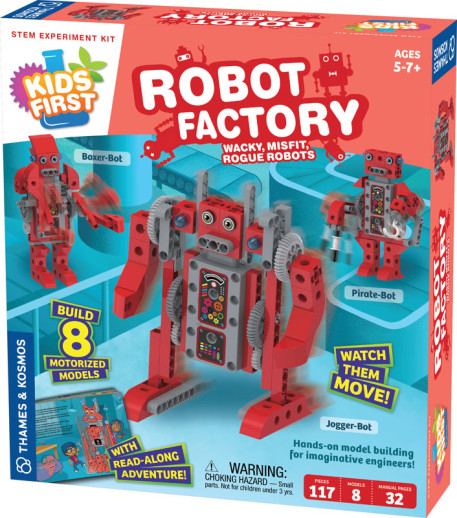We use cookies to make your experience better. To comply with the new e-Privacy directive, we need to ask for your consent to set the cookies. Learn more.
Robot Factory: Wacky, Misfit, Rogue Robots
- Small parts. Not for children under 3 years.
Build 8 mechanical robot models with an accompanying story in this introductory engineering kit! Use the gears, motor, and other building pieces to make wacky robots that move their arms and legs in unique ways, such as ski-bot, drill-bot, and boxer-bot. This STEM experiment kit is an engaging introduction to simple machines and robotics. Contains 117 building pieces and a 32-page storybook manual. Requires 2 AA batteries, not included.
Build a series of wacky, motorized robots with this introductory mechanical engineering kit for kids ages five and up. A beautifully illustrated 32-page storybook centers around the adventures of the Omegas — the family of makers and engineers featured in other Kids First early engineering kits.
This story takes the characters to a robot factory where the robots have gotten a little out of control. One by one, the robots are fixed up and put back into working order. As they follow the story, kids can build models of eight different robots and experiment with them to see how each one uses the battery-powered motor, gears, and other mechanical parts. Each robot moves its arms or legs in a different way, creating funny walking and moving behaviors, and also teaching kids how simple mechanical systems work. Large, cubic plastic building pieces make it easy for small hands to put the models together.
Robot Factory provides an engaging way to teach simple engineering concepts to young children, allowing parents, teachers, and caregivers to lay the groundwork for strong STEM-related skills and comprehension at an early age. Model building and experiments develop fine motor skill, mechanical engineering skills, visual-spatial skills, and reasoning and concept development skills.
This great new series is for your youngest engineers and scientists. Level 1 is for ages 3 to 5, and level 2 is for 5 to 7. This is a brand new line for Thames and Kosmos and is intended to introduce young learners to science and math concepts while also developing fine motor skills and visual/spatial reasoning. At level 1, the building is accompanied by an engaging storybook (24 pages in length), pretend play, and simple activities. The activities reflect the content of the story line and use chunkier building pieces that are great for smaller hands. Each kit comes nicely packaged in a durable storage container.
Level 2 takes children to the next level of science there are no storybooks, but a detailed 48-page, illustrated guide book comes in every kit. These kits introduce children to the scientific method and teach science basics using hands-on experiments. Level 2 kits do not have a storage container.
| Product Format: | Other |
|---|---|
| Brand: | Thames and Kosmos |
| Grades: | 1-3 |
| EAN/UPC: | 814743014879 |
| Length in Inches: | 11.125 |
| Width in Inches: | 10 |
| Height in Inches: | 2.625 |
| Weight in Pounds: | 1.15 |

